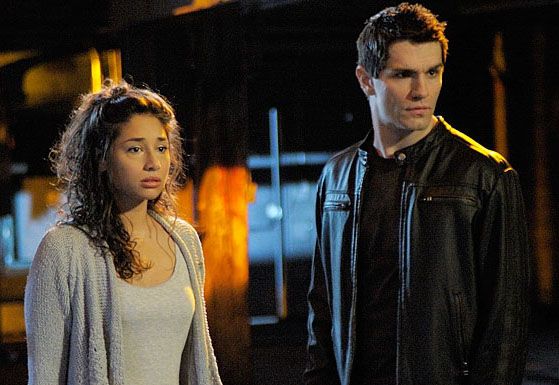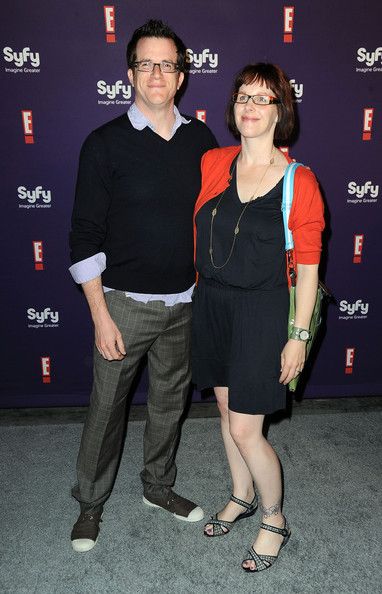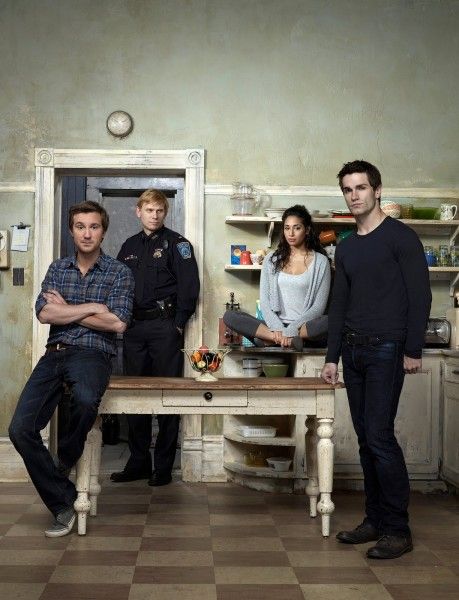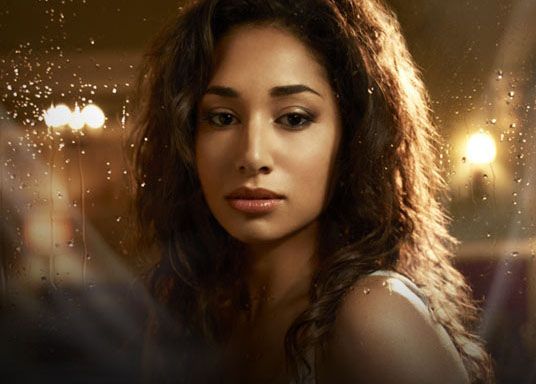The Syfy drama series Being Human, currently in its second season, follows three roommates – vampire Aidan (Sam Witwer), werewolf Josh (Sam Huntington) and ghost Sally (Meaghan Rath) – who try to lead normal lives while fighting the temptations of their supernatural side. This season, the three friends are all on their own dark and destructive paths, with people from their pasts returning to threaten their futures. As they fight harder than ever to maintain their humanity, it is put more in jeopardy than ever before.
During this recent exclusive phone interview with Collider, executive producers/writers/showrunners Jeremy Carver (Supernatural) and Anna Fricke (Men in Trees, Everwood) talked about how Season 2 has evolved from what they established in Season 1, why they think their show has managed to succeed when so many other remakes and re-imaginings haven’t, how the individual journeys will affect the core friendship of the characters, how much they draw on already existing creature mythology versus using their own imagination, the ways in which the new characters will affect the existing ones, and just how dark things will get this season. Check out what they had to say after the jump:
Collider: How is Season 2 different from Season 1?
ANNA FRICKE: I think that last season, they had the highest hopes of being able to pull off this experiment with humanity. This season, they’ve found that that’s a lot more than they originally thought. At the end of last season, they all thought they had freed themselves in various ways, with Aidan (Sam Witwer) killing Bishop (Mark Pellegrino), and with Josh (Sam Huntington) finally telling Nora (Kristen Hager) the truth about being a werewolf, and Sally (Meaghan Rath) getting her door and getting that closure, but then missing it. I think they all thought their future would be a little brighter, and this season, they see it’s a lot more complicated.
Obviously, it was important to have the connection to the original British series to draw viewers in, but now that you’ve done that and established this as a show on its own, is it freeing to be able to stories completely separate from that now?
JEREMY CARVER: Yeah. For the first season, it was a decision to follow the storylines, which was great, in its own way, but it’s a lot of fun to wipe the slate clean and start fresh. Of course, there’s always a debt owed to the original series, just because we’re starting from their construct. I think the fans were pleased, last year, with the way that we twisted the original series a bit while also staying true to it. But, we’re really looking forward to folks embracing a different vision for Season 2.
When so many TV remakes, re-boots and re-imaginings have failed, especially over the last few years, what do you think it is about this show that’s really allowed it to rise above that and succeed on its own merits?
FRICKE: I think we had an amazing template and amazing original material to work with for the first season, and what I appreciate about the second season is that we’ve jumped away from that. But, there’s always going to be overlap because we’re swimming in the same pond. I think it’s just a really strong concept.
CARVER: Furthermore, I think we have a principal cast that met a very stiff challenge, in Season 1. Everyone, including us, had a picture of what they’ve already seen, and the British cast was an extraordinary collection of folks. To watch our three characters mesh and just leap off the screen in the way they did, you can’t help but just get really jazzed and be like, “We really have something here.”
FRICKE: Yeah, the chemistry that they have is responsible for the show working.
CARVER: So, it all feeds on each other. It feeds on the scripts getting them excited, and then their performance gets us excited, and this energy courses from us to the crew to the cast. It’s a very, very positive working environment for everyone involved because I think everyone really believes, very strongly, in this show, in its own right. There are going to be inevitable overlaps sometimes, just by virtue of them being a couple seasons ahead of us, and you see things on their show that we’ve done. It’s unavoidable. But, we’re very, very excited and proud to present Season 2.
With this season focusing a bit more on individual storylines for the characters, was it fun to write those separate journeys, and was it even more fun to get everybody back together for scenes?
CARVER: It was tremendously fun to write the individual storylines. I think that it was actually much more of a challenge to get them back together again.
FRICKE: We really tried to bring more mythology in everybody’s world this year, so as a result, they all had a lot more going on individually. But then, we really had to work harder to make those cross-overs happen. The roommate moments are our favorite moments. The heart of the show is the three of them together, in that house, in their day-to-day lives.
CARVER: Individually, each one of our characters is going down pretty exciting yet tempting and dark paths. To do that, each one of them is confronting new variations on a theme, as it were. Each and every one of them are being confronted with a different type of vampire, werewolf or ghost than we’ve seen so far on the show, and it’s confronting each of them with a blend of temptation and danger. The real issue becomes, “What do you do when your support system, that’s always been there for you, at least for one season, is going down their own path and they might not always be there to catch you as you’re slipping?” The show very much reflects our characters getting enmeshed in their own individual journeys while grasping and clawing to maintain this unity that they’ve fought so hard to build, over the last year or so.
Aidan and Josh both wish they could avoid anyone and everyone else, of their supernatural species, but this season, they’re really stuck in the middle of what they’d rather have nothing to do with while Sally is getting drawn further in. How will that affect them, individually, as well as their friendship?
CARVER: This year, our characters are coming to the show with their eyes open a little more. You’ll see that they’re a little less innocent and naive, particularly with Josh. We’ve compared our characters a little bit to cops. They’ve got a little bit more under their belts, so not as much shocks them as quickly, this year. They’re a little bit more giving of each other’s tendencies. The problem this year is that, as they each find themselves enmeshed deeper than they ever thought they’d be, in their own monstrosity, it’s inevitable that things get so hairy for each and every one of them that it’s impossible for it not to have ramifications on their relationships. Each and every one of them is simultaneously reaching for and pushing away each other, in the way that people who are succumbing to temptation or addiction are apt to do.
Because you also get to have flashbacks on this show, is it fun to get to explore your characters through their histories, as opposed to just having to reveal it through dialogue?
FRICKE: Yeah, absolutely. It’s definitely a much more active and fun way to flesh things out. That’s the great thing about vampires and how old they are. Instead of talking about the old times, we can just show you.
CARVER: We do this show on a non-glamorous budget, so to be able to do the flashbacks that we do is an absolute testament to the cast and crew in Montreal, who really just pull stuff out of a hat. It just gets more and more spectacular, how they’re able to translate what we put to page to the screen. One of the most fun things about the show, just in terms of having that canvas to work with, is just to get to the beating heart of our characters. We spend most of the time on Aidan because he’s the most obvious person to go to, but that’s not to say that we couldn’t experiment with others, in the future, as well.
How much do you guys decide to draw on mythology that already exists for these creatures, and how much do you want to bring your own original viewpoint to it?
FRICKE: When we looked at the mythology, at the beginning of Season 1, and sat down with the other writers and the network, we talked about what was “existing,” as much as monsters or the supernatural can exist, and the popular rules for the mythology and chose what made sense to us. Everything springs from a logical or a sensible place, as much as it can, in this genre. We tried to keep things that felt consistent to us. If we’re ever making something up or adding something in, we try to make it come from a logical place.
CARVER: It’s always that balance between showing that human drama, and then always having that thing that reminds the viewer that these are, in fact, not humans. That’s part of the challenge.
FRICKE: Even just the fact that all of the furniture on the set where Sally sits is actually cement because she doesn’t make an imprint on it, are things that we’ll discuss, ad nauseam. And then, it starts to make your brain explode because you’re like, “Can she even sit on a chair? Why is it possible for her to even sit?” Things like that can drive you crazy. But, we do try to keep it fairly logical.
How will the new characters change the dynamic for your main cast?
CARVER: We introduced a new element to the vampires and a little bit more of the vampire hierarchy. Anchoring this hierarchy is a mother and daughter who are vampires. Mother is the mother of all the vampires in America, and her daughter, who was brought back to Boston is being played by Dichen Lachman from Dollhouse. It’s the daughter, who’s returned to Boston and the vampire society, that causes the most turbulence for Aidan and the other vampires, given that she is a very, very troubled spirit who left vampire society with a big bang, about a hundred years ago. Her return has everyone on pins and needles, not the least part of which is that Aidan himself has a very tangled relationship with her, in that he used to be her personal minder, as it were, back in the ‘30s, and there were the beginnings of a romantic entanglement, as well. She is a very unpredictable, wily and insecure character, who has been given this challenge to rise above what everyone expects of her, which is failure, and prove that she can be a leader like her mother. Aidan has been given the task of ensuring that this is so, but the problem is that, the more he helps her, the more he’s tempted to fall back into vampire society. She’s a wonderful character and a wonderful actress, and we’re absolutely thrilled to have her with us, for this season.
Aidan, as well, is faced with another major, significant player in his life, and that’s the last vampire he ever turned. In vampire speak, this would be his son, who’s the character of Henry, who he has not seen in close to a hundred years. Henry, who is played by Kyle Schmid, presents another problem for Aidan because, not only is this his son who has returned, but Henry is a fairly loyal but slightly misguided son, in the way that Aidan was to Bishop. He adds a whole bunch of fun and intrigue, and a bit of a heartache for Aidan. Between Suren and Henry, Aidan has more than a handful this year, in terms of dealing with things from his past.
Josh will be dealing heavily with the return of a very, very major character from his past, who will play majorly in the season. He will be called to account for things that he did in his life, before he ever came to Boston. And then, Sally is dealing with folks from her past. We’ll see more of Sally’s family. She’s also dealing heavily with the ramifications of having passed up her door, at the end of the season. That will cause her to deal with other species of ghosts, who may be calling upon her, as a result of her having passed up her door. In some ways, she has knocked the universe out of whack a bit, and that’s something she’s going to be called to account for, in a really, really fun, scary, dangerous and twisty way.
As you get darker with the story and where things are going with the characters, are you ever surprised with just how far you’re able to push things with the show?
FRICKE: We’re very grateful that we’re able to do that. The crux of humanity is the dark side.
CARVER: That’s one of the gifts of the original concept. It’s almost bottomless, what this show can hold and pull out, from humor to pain to romance to chills, thrills and scares. It’s really an incredibly deep well. I think it might go back to the essential quest to be human. In every regard, from the stories to the music, you seem to be able to throw anything at this show and, as long as it makes sense, it can work. It’s an absolutely joy to know that we can turn in many different directions and it seems to work.
Because these characters are all in obvious pain over who and what they are, what do you think it will take for them to be truly happy?
FRICKE: They will never be happy.
CARVER: The day they are truly happy is the day we sign off.
FRICKE: I’m kidding, but that’s the nature of the show. They want to be human, but they never will be. If they do find a solution to their problems, then that’s the series finale. They’ll all walk off into the sunset.
CARVER: No matter what they’re going through, we always try to bring our cast together. They’re always reaching back for each other because, with each other, whether it’s a laugh or a cry or a hug, I don’t know if I would call it happiness, but there’s a connection. Finding that connection with another kindred spirit is about as good as most of us can hope for.
FRICKE: For them, it’s about relationships. They all find these pockets of happiness, and they have that moment of hope where they think, “We’re doing it. We’re actually doing it. We’re actually living the life that we set out to live.” Josh’s relationship with Nora is a great example. That relationship has great, beautiful moments where things are working. It all comes back to their friendship with each other. That’s why they wanted to live together, in the first place, and that’s what works, like when Josh is able to make dinner for everyone, even though nobody is going to eat. It’s moments like that, of embracing the situation and being able to feel okay with it.
CARVER: While it’s often the stated goal, when we wake up in the morning, to be happy, I think the reason so many people identify with this show and these characters, even though they’re not human, is that despite the pain, they’re finding those ways to keep going. All of us, at the end of the day, are always just looking to keep putting one foot in front of the other. Through all the heartbreak and pain, you just want to keep going. What are those things that keep us going? At the heart of it, it’s that connection. Probably the stated goal is happiness, but at the end of the day, it comes down to an understanding that there’s different ways of achieving that.
Being Human airs Monday nights on Syfy.




